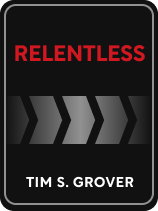

This article is an excerpt from the Shortform book guide to "Relentless" by Tim Grover. Shortform has the world's best summaries and analyses of books you should be reading.
Like this article? Sign up for a free trial here .
Is being great the best you can be? What makes someone great?
According to motivational speaker Tim Grover in his book Relentless, being someone great still isn’t good enough. In fact, he encourages everyone to be unstoppable. Nonetheless, he identifies with makes someone just “great.”
Let’s look at Grover’s definition of a great person, and learn what makes someone great.
Defining the “Great”
One step above “good” people, there are the “great” people—people whom Grover says can be relentless under specific circumstances. So, what makes someone great compared to good? While the great people have more control over their fears and self-doubts than the good poeple, these fears still plague them from time to time. Grover says that great people attempt to compensate for their fears with two different methods.
Great People Need Extensive Preparation
Great people can be relentless, but only in specific situations they have prepared for extensively. This preparation gives someone great a clear planned approach to the situation, which allows them to avoid overthinking and commit their focus to success. However, if circumstances unexpectedly change, creating a situation that someone great hasn’t prepared for, they’ll experience the same self-doubts and fears that the good have and freeze up. This is why the great can only be relentless sometimes—their confidence is situational.
For example, a great musician doesn’t overthink or freeze up as long as they’ve spent a long time studying the specific pieces they’ll play. However, during a performance the musician loses their place, their confidence shatters, and they freeze up.
(Shortform note: Sian Beilock (Choke) explains the science behind why unfamiliar situations cause you to freeze up. When you’re faced with a situation you know well, you experience stimulation in the portions of your brain responsible for the actions associated with that situation. However, in an unfamiliar situation, those parts of the brain aren’t as active because your brain doesn’t have associated actions, and therefore, you can’t respond as quickly. Since great people only plan for specific situations, it follows that their brains can only respond with immediate action to those specific circumstances.)
Great People Need Recognition From Others
Grover argues that the inconsistent confidence in someone great also means that they crave recognition—they try to ward off their fear and self-doubt by having others acknowledge their successes. However, other people can’t get rid of a great person’s insecurities; truly doing so requires developing unstoppable confidence and focus.
Boost Your Confidence With Self-Validation
If this need for recognition is something you struggle with, psychologists recommend developing self-validation: The ability to accept your emotions and experiences, encourage yourself, recognize your strengths, and accept mistakes. By developing self-validation, you’ll judge yourself less harshly when you don’t perform your best and be able to give yourself positive recognition—as a result, you’ll need fewer positive judgments from others.
One effective way to practice self-validation is to talk about mistakes or underperformance without inserted judgment—that is, talk only about the facts of the event. For example, if you screw up a presentation at work, don’t think, “I’m such a failure and I’ve ruined everything.” That’s a statement grounded in harsh judgment rather than your actual experience. Instead, think, “I feel frustrated because that presentation didn’t go how I wanted it to.” This statement helps you accept that the mistake happened, without discouraging you with harsh and untrue judgments.

———End of Preview———
Like what you just read? Read the rest of the world's best book summary and analysis of Tim Grover's "Relentless" at Shortform .
Here's what you'll find in our full Relentless summary :
- The qualities you’ll need to become the best in your field
- Why sacrifices and discomfort are necessary for growth
- Why you should practice indulging in your primal self






